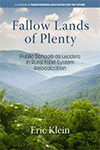
Fallow Lands of Plenty
Public Schools as Leaders in Rural Food System Relocalization
By:
Eric Klein, University of North Carolina Asheville
A volume in the series: Transforming Education for the Future. Editor(s): Jing Lin, University of Maryland. Rebecca L. Oxford, University of Maryland. Vachel W. Miller, Appalachian State University. Amanda Jane Fiore, State Department.
Published 2023
Can public schools feed themselves? That deceptively simple question is like a fingernail picking at a fray in the fabric of 21st century public education. Fallow Lands of Plenty chronicles one high school’s attempt to feed itself and, in doing so, unravels the fabric of neoliberal education, exposes its logics of dependence and control, and begins to weave a new tapestry of education for community cooperation and resilience.
Set during the ongoing transition between post-industrial globalization and the community structures that are to come, this rich narrative moves from furrows of Appalachian red clay soil, to the mountaintop homesteads of elder seed savers, to the conveyor belts of sterilized food sorting machines, and, finally, to a school’s cafeteria on the day that 250 portions of student-grown sweet potatoes were served.
Along the way, Fallow Lands centers knowledges of place as well as the literal and metaphorical seeds of relocalized food and education systems. Critical and theoretically informed, the text disobeys the values, purpose and canon of public education and proposes a fledgling pedagogy to address the challenges of the coming age.
ENDORSEMENTS:
"Eric Klein’s Fallow Lands of Plenty is a stirring manifesto for transforming public schools into centers of learning about community resilience and for transitioning to a “pedagogy of relocalization” that prepares students for the unstructuring of the hegemonic corporate food regime set in motion by climate collapse. What sets Fallow Lands of Plenty apart is the ethic of relational care that informs Klein’s deeply personal style of writing. Incisive, radical, and accessible, the writing uplifts students, teachers, elders, cafeteria women, and extension agents as co-producers of new modes of public schooling in rural Appalachia that foster collective ownership of learning and intergenerational transfers of knowledge cast out by official state curricula." — Anatoli Ignatov, Appalachian State University
"A must read for today and tomorrow’s generations. Fallow Lands of Plenty reminds us that our ancestors did things a certain way, for certain reasons, and the survival of this knowledge may very well mean our own." — Heath Robertson, Cherokee Central Schools
CONTENTS
Foreword. SECTION I: INTRODUCTION. CHAPTER 1: Calf Deep in Red Clay. CHAPTER 2: Making New roads at the Intersection of the Food and Public Education Systems. CHAPTER 3: The Long View on 21st Century American Education. SECTION II: SETTING. CHAPTER 4: Baily County CHAPTER 5: Sternhill Farm. CHAPTER 6: Highland High School. CHAPTER 7: Highland High School’s Cafeteria. SECTION III: PARTICIPANTS. CHAPTER 8: Student-Grown Food Participants. CHAPTER 9: The Seeds Saver of Highland High School. CHAPTER 10: The Storyteller and His Positionalities. CHAPTER 11: Reflexive Reflections on Student Seed Saver Recruitment. CHAPTER 12: Reflexive Reflections on Recruiting Community Seed Savers. SECTION IV: THE COLLECTIVE FORGETTING. CHAPTER 13: Seeds That Remember. CHAPTER 14: The Fading Agricultural Traditions of Bailey County. CHAPTER 15: 21st Century Agricultural Education. CHAPTER 16: Seeds That Forget. SECTION V: THE ACTIONS WE TOOK. CHAPTER 17: Heritages of Action. CHAPTER 18: Horses Pulling in Different Directions. CHAPTER 19: Local Food Systems and Food Sovereignty. CHAPTER 20: Teaching and Learning How to Grow Our Own Food. CHAPTER 21: Student-Grown Food Is Not Farm to School. SECTION VI: ANALYSIS. CHAPTER 22: Comment on Farm to Cafeteria Success. CHAPTER 23: System (Mis)(Re)Alignment. CHAPTER 24: Elder Knowledge Versus School Knowledge. CHAPTER 25: Appreciation and Values in the Cafeteria. CHAPTER 26: Embedded Agency. CHAPTER 27: Food as a Community Connector. SECTION VII: GOING FORWARD. CHAPTER 28: Summary of Key Findings. CHAPTER 28: Relocalization Pedagogy. CHAPTER 30: Closing Thoughts. Epilogue. References. A: Timeline of Activities. B: Alphabetical List of Project Participants.
-
Paperback979-8-88730-292-8
Web price: $45.04 (Reg. 52.99)
-
Hardcover979-8-88730-293-5
Web price: $80.74 (Reg. 94.99)
- eBook979-8-88730-294-2

-
 Apocalyptic Leadership in Education
Facing an Unsustainable World from Where We Stand
Apocalyptic Leadership in Education
Facing an Unsustainable World from Where We Stand
-
 Contemplative Pedagogies for Transformative Teaching, Learning, and Being
Contemplative Pedagogies for Transformative Teaching, Learning, and Being
-
 Critical Conversations about Religion
Promises and Pitfalls of a Social Justice Approach to Interfaith Dialogue
Critical Conversations about Religion
Promises and Pitfalls of a Social Justice Approach to Interfaith Dialogue
-
 Hope for the Embattled Language Classroom
Pedagogies for Well-Being and Trauma Healing
Hope for the Embattled Language Classroom
Pedagogies for Well-Being and Trauma Healing
-
 Re-Envisioning Higher Education
Embodied Pathways to Wisdom and Social Transformation
Re-Envisioning Higher Education
Embodied Pathways to Wisdom and Social Transformation
-
 The Wisdom Way of Teaching
Educating for Social Conscience and Inner Awakening in the High School Classroom
The Wisdom Way of Teaching
Educating for Social Conscience and Inner Awakening in the High School Classroom
-
 Toward a Spiritual Research Paradigm
Exploring New Ways of Knowing, Researching and Being
Toward a Spiritual Research Paradigm
Exploring New Ways of Knowing, Researching and Being

